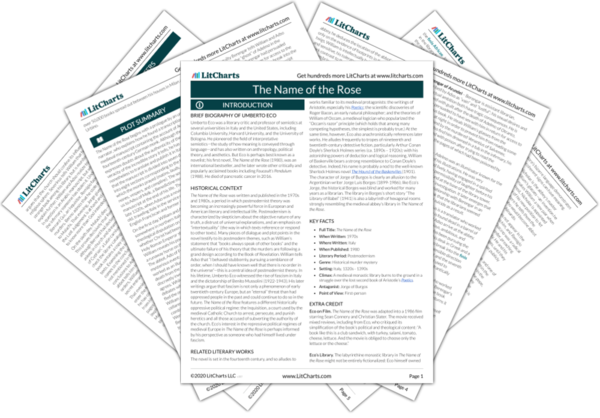The finis Africae is a hidden room in the abbey’s labyrinthine library. It is called the “finis Africae”—the “end of Africa,” in Latin—because it is adjacent to the “Leones” rooms containing books by African authors. When William of Baskerville and Adso of Melk visit the labyrinth, they are perplexed to find that the room is seemingly inaccessible, walled up and concealed behind a mirror that reflects ghostly images. Venantius of Salvemec tried to break into the room, but his cryptic note (“The hand over the idol works on the first and the seventh of the four”) serves to further obscure the truth rather than clarify the mystery. The result, then, is yet more misdirection, like the distortions in the mirror; William and Adso only later realize that Venantius was instructing them to press the fourth and seventh letter of the word “quator” (the Latin for “four”) in the phrase written above the “idol,” or the mirror. As William observes, “this place of forbidden knowledge [i.e. the library] is guarded by many and most cunning devices.” Although the ostensible purpose of a library is to preserve knowledge and make it accessible to future generations, this library is designed to keep out intruders and frustrate those who would try to penetrate its mysteries. The finis Africae—the most secret room in the labyrinth—is symbolic of the strict control in place at the abbey over the dissemination of knowledge. When William and Adso do eventually reach the finis Africae by a secret staircase, they find that it contains a forbidden book that Jorge of Burgos had tried to conceal by burying it in this hidden room and murdering those who tried to enter. In this sense, the finis Africae is the most extreme example of the way in which, as William puts it, “knowledge is used to conceal rather than enlighten.” The purpose of the room and all the “cunning devices” that guard it is to keep knowledge secret and hidden, rather than to bring the truth to light.
The Finis Africae Quotes in The Name of the Rose
[O]nly the librarian knows, from the collocation of the volume, from its degree of inaccessibility, what secrets, what truths or falsehoods, the volume contains. Only he decides how, when, and whether to give it to the monk who requests it; sometimes he first consults me. Because not all truths are for all ears, not all falsehoods can be recognized as such by a pious soul.

Unlock explanations and citation info for this and every other The Name of the Rose quote.
Plus so much more...
Get LitCharts A+And, Benno added with a smile, how many times had he himself not been stirred by desires of the intellect so violent that to satisfy them he would have consented to complying with others' carnal desires, even against his own inclination.
This place of forbidden knowledge is guarded by many and most cunning devices. Knowledge is used to conceal, rather than to enlighten. I don’t like it. A perverse mind presides over the holy defense of the library.
There, I said to myself, are the reasons for the silence and the darkness that surround the library: it is the preserve of learning but can maintain this learning unsullied only if it prevents its reaching anyone at all, even the monks themselves. Learning is not like a coin, which remains physically whole even through the most infamous transactions; it is, rather like a very handsome dress, which is worn out through use and ostentation. Is not a book like that, in fact? Its pages crumble, its ink and gold turn dull, if too many hands touch it.
“But then,” I said, “what is the use of hiding books, if from the books not hidden you can arrive at the concealed ones?”
“Over the centuries it is no use at all. In a space of years or days it has some use. You see, in fact, how bewildered we are.”
“And is a library then, an instrument not for distributing the truth
but for delaying its appearance?" I asked, dumbfounded.
The good of a book lies in its being read. A book is made up of signs that speak of other signs, which in their turn speak of things. Without an eye to read them, a book contains signs that produce no concepts; therefore it is dumb. This library was perhaps born to save the books it houses, but now it lives to bury them.
The library had been doomed by its own impenetrability, by the mystery that protected it, by its few entrances. The church, maternally open to all in the hour of prayer, was open to all in the hour of succor. But there was no more water, or at least very little could be found stored, and the wells supplied it with a parsimony that did not correspond to the urgency of the need.












